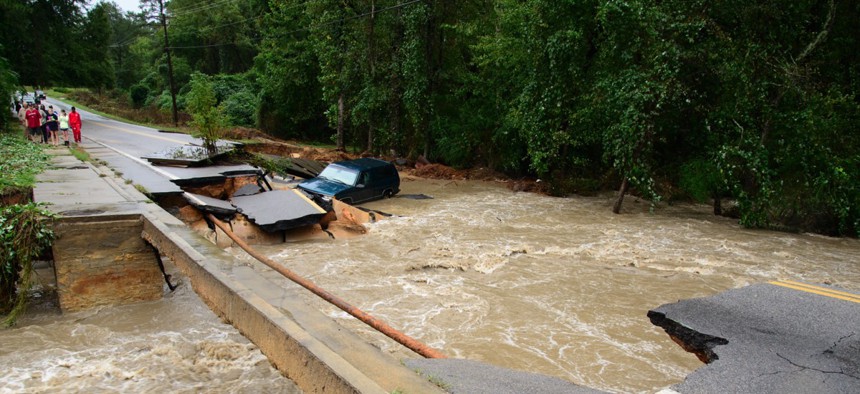Vulnerable Communities Are Using Innovative Financing to Prepare for Natural Disasters

Flooding in Columbia, South Carolina.
Spending on mitigation now will save lives and taxpayer dollars.
This article was originally published by Flood-Prepared Communities, an initiative of The Pew Charitable Trusts, and was written by Laura Lightbody.
Billion-dollar natural disasters used to strike the United States once or twice a year. But since 1980, such events have occurred five to 10 times annually. These catastrophes threaten public safety, disrupt daily activities, and lead to economic losses. In October, Hurricane Matthew left at least 24 dead and caused $6 billion in insured property loss when it hit the southeastern United States. As the numbers and costs continue to climb, homeowners, communities, and the federal government will be challenged to make wise financial investments that will help save lives and lower the costs of future storms.
Research by an independent group of experts in 2005 found that every dollar invested in mitigation results in $4 saved. Take, for example, Missouri. From 1999-2008, publicly funded buyouts of 885 flood-prone properties saved nearly $97 million, a 212 percent return on investment. And the insurance company FM Global, which helps commercial property owners prepare for hurricanes, calculated that its clients sustained eight times less damage on average than those who didn’t follow its loss-prevention advice during Hurricane Katrina. Companies that spent $7,400 on risk improvement before Katrina avoided an average $1.5 million in losses. There’s no doubt that investing now will pay dividends.
Yet a 2016 report by the Government Accountability Office (GAO) found that of the $277.6 billion that the federal government spent on disaster assistance from fiscal years 2005-14, the Federal Emergency Management Agency (FEMA) designated less than $600 million to the main federal program that helps communities mitigate the impacts of natural disasters before they happen.
Following the federal government’s example, states, localities, and even individuals have underinvested as well. Studies show that few property owners prepare for natural disasters. Only an estimated 10 percent of flood- and earthquake-prone households have taken mitigation measures. And according to a 2015 GAO report, many states likely rely on post-disaster federal funds to mitigate future risk instead of dedicating their own resources prior to disasters.
With tighter budgets and storms growing more frequent and intense, states and communities are experimenting with innovative approaches to raise awareness of risk, generate smarter investments, and shift resources to pre-disaster mitigation.
Here are a few examples of communities that are thinking creatively about financing risk reduction:
- In September, the District of Columbia Water and Sewer Authority issued the nation’s first environmental impact bond, a partnership using money from a range of investors to finance green infrastructure to help reduce flood risk. Proceeds from the $25 million tax-exempt bond will be used to construct projects that mimic natural processes to slow stormwater surges from heavy rainfall. The cost of installing the infrastructure is paid by the utility, but the performance risk of managing stormwater runoff is shared by the authority and its investors.
- Nonprofit group piloted insurance and long-term loans in coastal South. MyStrongHome, a nonprofit focused on making communities stronger, is lending homeowners in coastal areas the upfront cost of meeting standards developed by the insurance industry for home risk-mitigation activities. These include enhanced roof deck attachments, sealed roof decks, high-wind-rated roof coverings, gable-end wall bracing, and opening protection systems. Homeowners have five years to repay the loan, using savings from reduced insurance premiums because of the decreased risk to their structures. Piloted in Alabama, South Carolina, and Louisiana, the program is expanding to other areas at risk of hurricanes. MyStrongHome is not alone; Zurich Insurance Group also endorsed the concept of coupling savings on insurance premiums with long-term loans tied to the property.
- Charlotte-Mecklenburg County, North Carolina, funds buyouts through stormwater fees. Stormwater fees are being levied to fund the relocation of houses, apartment buildings, and businesses located in flood-prone areas in Charlotte-Mecklenburg County. The program includes “orphan” buyouts for homes or buildings next to properties that qualify for federal buyouts. The goal is to encourage the last homeowners living in a high-risk area to move so roads can be removed and the site can be restored to its natural function as a flood plain. More than 400 flood-prone houses have been purchased, and more than 600 families no longer reside in high-risk areas.
Federal policymakers are also seeking new ways to encourage and finance risk reduction measures. In February, a group of agencies led by FEMA and the Department of Transportation began developing a federal mitigation investment strategy to coordinate activities across the nation. The White House released a fact sheet in October that highlights actions by federal agencies to ensure that structures are designed and built to be resilient to natural disasters. Joseph Nimmich, FEMA’s deputy administrator, stressed the importance of taking such measures at a recent congressional hearing examining the cost of federal disaster response. “Mitigation efforts taken before disasters strike can significantly lessen their financial impacts on the nation,” he said in his written testimony.
It is critical for the nation to prepare before natural disasters occur in order to increase safety, protect property, and decrease costs. New financing mechanisms should be examined to encourage property owners, communities, and states to reduce risk. At the federal level, Congress must support increased investment in pre-disaster mitigation as well as in innovative strategies to help reduce costs and save lives in an era of catastrophic weather.





